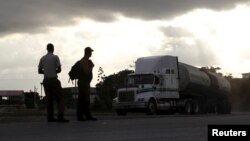Low commodity prices, a drought at home and Venezuela's economic crisis have created a cash shortage for Cuba's Communist government, restricting its ability to trade just as it could be taking advantage of an economic opening with the United States.
State companies have cut imports and are seeking longer payment terms from suppliers, diplomats and foreign business people say.
The cash crunch, combined with Cuba's hesitancy to embrace a recent softening of the U.S. economic embargo, demonstrate some of the complications U.S. companies face in Cuba even though Washington is chipping away at the sanctions.
The Caribbean island's cash flow has been cut by low prices for nickel, one of its leading exports, as well as for oil.
Cuba receives oil on favorable terms from Venezuela and refines and resells some of it in a joint venture with its socialist ally. But prices for refined products are down in tandem with crude.
"There is no money," said the foreign director of a manufacturing firm in a joint venture with Cuba. Like others interviewed for this story, the director wished to remain anonymous to avoid annoying the government.
Comments about the liquidity shortage are echoed by others doing business with Cuba even with tourism up 17 percent this year.
"Cuba is clearly feeling the squeeze," said the commercial attache of one of the country's top trading partners. "They are falling behind on some payments and asking suppliers for credit terms of 365 days or longer, compared with 90 days to 180 days."
Economy Minister Marino Murillo, speaking to the National Assembly in July, said export revenue had been less than expected and "adjustments" would be made.
Identifying those adjustments is difficult as Cuba's finances are opaque. It is not a member of any international lending organization and the local currency has no value abroad.
Oil imports
Cuba imports more than 60 percent of its food and more than 50 percent of its oil, but the benefits from lower international commodity prices have been offset by the need for more imports due to the worst drought in more than a century.
In addition, the collapse of oil prices punishes Cuba given the terms of its oil deal with Venezuela. It receives more than 100,000 barrels of oil per day as part of an exchange that sends Cuban professionals to Venezuela. Some 30,000 doctors and nurses, plus another 10,000 professionals, are posted in Venezuela.
Cuba also receives cash for its professionals. Economists and oil market experts believe the amount is tied to oil prices, meaning Venezuela would pay less to Cuba when prices are down.
Venezuelan crude has fallen from $88 per barrel to less than $45 per barrel over the past year. Global nickel prices are down about 50 percent since May 2014, forcing cuts in production and leaving Cuba's industry barely profitable.
As a result, Cuba has had to cut back on U.S. purchases for its hard currency stores that sell imported goods, said an American trader who sells food to Cuba under an exception to the U.S. trade embargo.
President Barack Obama reversed a half century of hardline anti-Cuba policies late last year and since then has twice eased restrictions on doing trade with Cuba.
Among other changes, Cuba can now buy certain U.S. products such as badly needed consumer telecommunications devices, software and hardware in addition to building materials, tools and equipment for its nascent private sector.
That trade has yet to flow, in part because U.S. restrictions on offering credit remain in place.
"The Obama measures all require Cuba to pay cash for goods and services but they simply do not have much," the trader said.
Cuba has experienced payment problems before, the last time in 2008-2009, when it temporarily froze debt payments and the bank accounts of foreign companies and forced a rescheduling of supplier debts.
The diplomats and business people doubt there will be a similar crisis this time because Cuba has increased its reserves under austerity measures introduced by President Raul Castro, who replaced his ailing brother Fidel Castro in 2008.
"Raul has made a point of improving Cuba's financial credibility and he has run up trade and current account surpluses since 2010," a western banker said. "He will cut imports and growth and turn to his reserves to meet any foreign exchange deficit before sacrificing that credibility."





